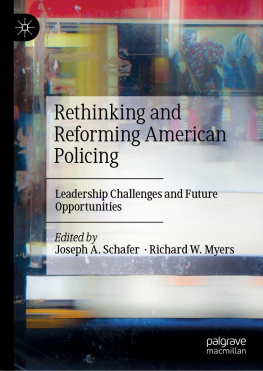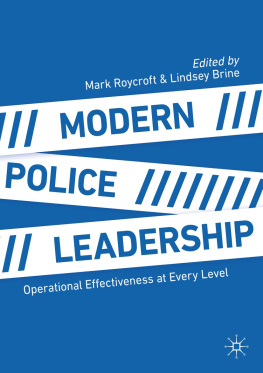WHAT MATTERS IN POLICING?
Change, values and leadership in turbulent times
Auke van Dijk, Frank Hoogewoning and Maurice Punch
First published in Great Britain in 2015 by
Bristol BS2 8BB UK Tel +44 (0)117 954 5940 e-mail pp-info@bristol.ac.uk www.policypress.co.uk
North American office: Policy Press c/o The University of Chicago Press 1427 East 60th Street Chicago, IL 60637, USA t: +1 773 702 7700 f: +1 773-702-9756 e:sales@press. uchicago.edu www.press.uchicago.edu
Policy Press 2015
British Library Cataloguing in Publication Data
A catalogue record for this book is available from the British Library
Library of Congress Cataloging-in-Publication Data
A catalog record for this book has been requested
ISBN 978-1-4473-2692-2 paperback
ISBN 978-1-4473-2691-5 hardcover
ISBN 978-1-4473-2695-3 ePub
ISBN 978-1-4473-2696-0 Kindle
The right of Auke van Dijk, Frank Hoogewoning and Maurice Punch to be identified as authors of this work has been asserted by them in accordance with the Copyright, Designs and Patents Act 1988.
All rights reserved: no part of this publication may be reproduced, stored in a retrieval system, or transmitted in any form or by any means, electronic, mechanical, photocopying, recording, or otherwise without the prior permission of Policy Press.
The statements and opinions contained within this publication are solely those of the authors and not of the University of Bristol or Policy Press. The University of Bristol and Policy Press disclaim responsibility for any injury to persons or property resulting from any material published in this publication.
Policy Press works to counter discrimination on grounds of gender, race, disability, age and sexuality.
Cover design by Hayes Design
Front cover image: www.alamy.com
Readers Guide
This book has been optimised for PDA.
Tables may have been presented to accommodate this devices limitations.
Image presentation is limited by this devices limitations.
Acknowledgements
In February 2013, we visited the UK and would like to thank the following for their willingness to meet with us and share their ideas, which was most valuable: Professor Ben Bowling (Kings College London); Professor Robert Reiner, Dr Janet Foster, Dr Jennifer Brown (London School of Economics); Julian Dixon (Inspector, British Transport Police); Geoffrey Markham (former Assistant Chief Constable, Essex Police); Stan Gilmour (Detective Superintendent, Thames Valley Police); and Professor Peter Neyroud (Visiting Fellow Nuffield College, Oxford; Resident Scholar at the Institute of Criminology, Cambridge; former Chief Constable of Thames Valley Police and previously Chief Executive Officer of the former National Police Improvement Agency). In particular, we are grateful to Peter Neyroud for his hospitality at Nuffield College and for his illuminating presentation and discussion on leadership, change, knowledge and professionalisation in British policing.
We also drew on the expertise of a number of colleagues through visits, Skype and phone calls on one or more occasions, and much appreciate the useful information and insights from Professor Michael Useem and Preston Cline (Center for Leadership and Change Management, Wharton School, University of Pennsylvania); Professor Steve Savage (University of Portsmouth); Professor Philip Stenning (Griffith University); Professor Andrew Goldsmith (Flinders University); Ralph Crawshaw (former Chief Superintendent, Essex Police); Dr Jonathan Crego (Critical Simulations Ltd, Hydra Foundation and University of Liverpool); Warwick Jones and Vicki Herrington (Australian Institute of Police Management); Dr Steve Tong (Canterbury Christ Church University); Professor Peter Manning (Northeastern University); Professor David Bayley (State University of New York, Albany); Professor Paul Rock (London School of Economics); Dennis Weeks (Metropolitan Police Federation); Caroline Geradts (National Police, Amsterdam Unit); Pierre van Steen (Commissioner, National Police, Amsterdam Unit); Nick Hogeveen (photographer, National Police, Amsterdam Unit); Chris Noble (Chief Superintendent, Police Service of Northern Ireland); and Richie Adams (Chief Inspector, Police Scotland).
Our gratitude also extends to those who commented critically and valuably on the draft text Ben Bowling, Jennifer Brown, Robert Reiner, Peter Manning, Clifford Shearing and Bernard Welten and for the thoroughness of the three anonymous reviewers. We also much appreciate the amicable professionalism of the team at Policy Press. Finally, we would especially like to thank our partners, Connie, Christa and Corry, and other family members for their support and encouragement while writing this book.
Auke van Dijk, Frank Hoogewoning and Maurice Punch
Baarn/Leiderdorp/Amstelveen, January 2015
Abbreviations
United Kingdom
We use UK when referring to the society comprising England, Wales, Northern Ireland and Scotland, and British with excuses for any offence for the police forces of England, Wales, Northern Ireland and Scotland. Much of our material on British policing relates to England and Wales and we shall indicate when that is not the case. There are, in fact, three separate police systems, so there is no single UK model, but they do have some common roots and features, and people frequently refer to the British policing model. In recent years, all three systems have been subject to substantial change. For example, the Association of Chief Police Officers (ACPO, England and Wales) has been abolished and the Council of Chief Officers, which was the central part of ACPO, has become the National Police Chiefs Council (NPCC) (Parker Report, 2014). ACPO was formally a limited company, with considerable influence but rather unclear accountability, and comprised nearly 300 members including all chief officers and some other police related personnel. Policing in Northern Ireland, which was always closer to the colonial model of policing within a separate administrative and judicial framework, is conducted by a single force, has become closer to policing in England and Wales in recent years (with chief officers attending ACPO, although not in a formal capacity), and follows much of the legislation passed in England and Wales. There are sometimes amendments to that legislation and to governance to fit the specific circumstances of Northern Ireland. Scotland has always had its own distinct judicial system and had an Association of Chief Police Officers Scotland (ACPOS) until 2013, when it formed a single, national force with one Chief Constable. For clarification, chief officers refer in most British forces to Assistant Chief Constable (ACC), Deputy Chief Constable (DCC) and Chief Constable (CC). Londons Metropolitan Police Service (MPS or colloquially the Met) uses different terms for chief officers while the chief is known as Commissioner. The other ranks are constable, sergeant, inspector, chief inspector, superintendent and chief superintendent.
| ACC | Assistant Chief Constable |
| ACPO | Association of Chief Police Officers (England and Wales) (until 2015) |
| ACPOS | Association of Chief Police Officers Scotland (until the founding of Police Scotland in 2013) |
| BPM | British policing model |





